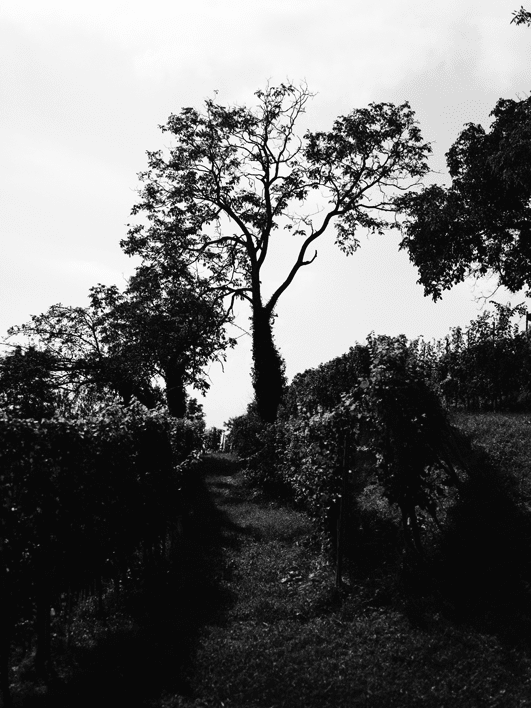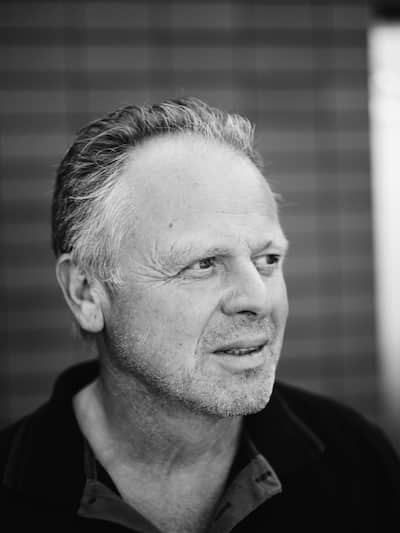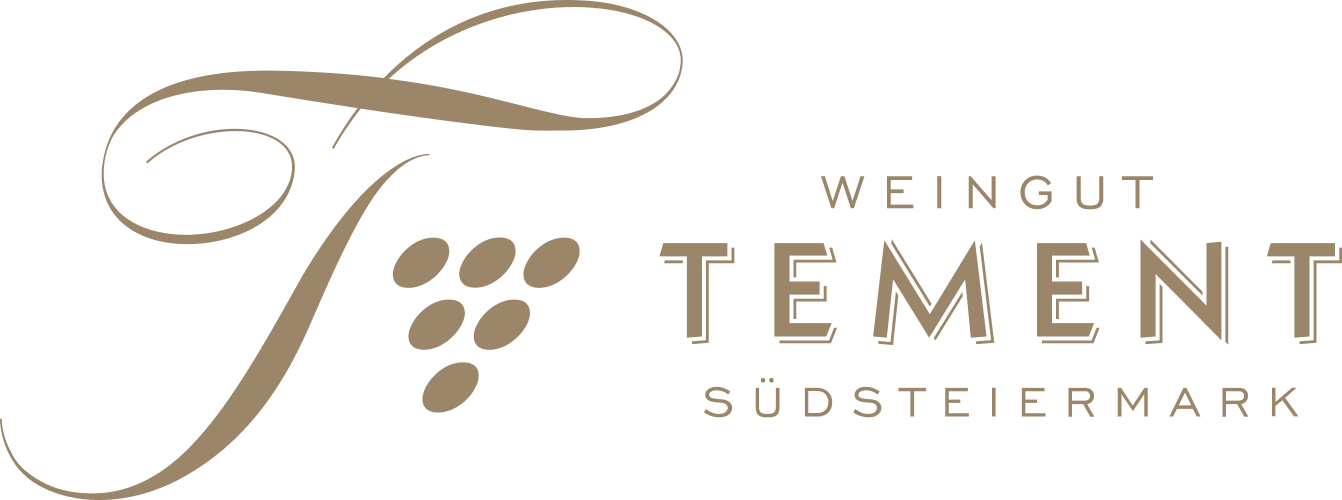

Manfred, we are sitting here in the middle of your vineyards. How does it feel when you consider that you started small over 40 years ago? What was and is your personal drive?
It may sound strange, but my drive has hardly changed over the years. My father made the business attractive to me. Even then he had a strong sense of quality, even though the wines were sold in liter bottles. I have the appreciation of the product and other wine regions from him. Even then, we drank a good bottle of wine with our meal every Sunday. Wines that my father brought and that were discussed afterwards. We have looked outside the box. & Nbsp;
You then went to Klosterneuburg and further refined your understanding of wine. How can you imagine that?
My father chose the school in Klosterneuburg for me. The apprenticeship was intended as a safeguard in case I couldn’t make it with my own company. When my father suddenly died, the fear of not being able to make it was my greatest motivation. I wanted to show him that it was possible.
Who or what inspired you?
It was a different time. I had to teach myself a lot. There was a completely different understanding of quality. The wine was – like the schnapps – a product that was not held in high esteem. You had no problem with processing bad grapes. But I was of the opinion that you should only process what you eat. I just wanted to process food quality. The difference was quickly noticeable to people. The rise to a quality winery then went pretty quickly.
Were there any other criteria for success apart from & nbsp; quality? & nbsp;
I realized relatively quickly that marketing is at least as important as winemaking. Our little wine tavern laid the foundation for this. Because of the quality offered there, we got good people. People experienced wine and food as a unit. The spark quickly jumped over there, outside of the own company it was much more difficult. The flagship businesses in gastronomy, above all Willi Haider with the “Stündl in Graz and Heinz Reitbauer senior in Vienna, helped me and the wines. This made us nationally and later also internationally visible.” My father made the business appealing to me. When he died unexpectedly, I wanted to show him that I can make a living from my idea of making wine. “
It all happened incredibly quickly. Did you still have a sense of the pace yourself?
Back then I was frankly taking everything I could get. At some point the success story took on its own momentum. In the beginning I even put up posters to sell my wines to the people. You can no longer imagine that today. Back then, the whole campaign brought me a single customer. That was a so-called “delivery point” in Carinthia. A cider bar that got 1000 liters of wine every 3-4 months. That was pretty neat. But because people stopped drinking cider, they stopped doing it. & Nbsp; (smiles)
40 years is a long time. You experience a lot, make decisions every day. Some affect you only & nbsp; yourself, while others affect the entire system. & Nbsp; Would you & nbsp; do it all over & nbsp; exactly & nbsp;
By and large, yes! However, one cannot transfer the time then into the now. If I started today, there would be other conditions and options. When I started, no one drank a single wine out of eighth glasses. The Wildon carpenter and later operator of the Jaglhof, Herbert Hirtner, made it clear to me in 1981 that we still have a lot to do. What I was doing back then was maybe good drinking quality, but nothing more. Just because someone makes a good schnitzel doesn’t mean they’re a good cook. A lot has happened since then. Still, it hasn’t got any easier.
Is there really nothing you would change?
(thinks briefly)
I would only rely on Sauvignon Blanc. One grape variety is enough. At that time I listened too much to other people who said Sauvignon Blanc alone wouldn’t work. Today I would pull this off. No ifs or buts. & Nbsp;
Where does this consistency and the special relationship with Sauvignon Blanc come from?
I realized very early on that this grape variety was the best for the region. You could create quality and set yourself apart from other regions. As far as the shelf life of these wines is concerned, we are still unmatched. Sure, you could also make a great Burgundy, but you can also find it elsewhere. & Nbsp; “If you want to be successful, you mustn’t listen to what the crowd is doing. That’s why you’re always a little lonely if you’re ahead of your time. “
You are currently working on the Zieregg & nbsp; very small-scale. As a result, knowledge about Sauvignon Blanc is enormous. Doesn’t that also increase the desire to experiment?
Everything is possible in terms of production technology. You definitely stay curious and enjoy your work. In terms of marketing, it looks a little different. You have to think about whether you can even market it in such a small way. Because in the end the consumer has to understand the wines. So sometimes it would be & nbsp; better if you only had two wines in the range. & Nbsp; (laughs) & nbsp; The small parts and the concentration on one grape variety have without question led to an excellence. The resulting potential is enormous. & Nbsp;
A brand like Tement is always on the move. Armin, & nbsp; Stefan and you are strong characters with very different & nbsp; points of view. Where is the & nbsp; company developing?
We try to make collaborative decisions. Only if they do not tolerate delay and a delay would only damage operations do you often have to act alone. In my case, this mainly affects the vineyard. When the grape is in danger, there is no time for discussion. It’s different in the basement.
How important are the different connections within a family?
I was always used to doing everything with myself. I hardly allowed comparisons with others. Today the boys are the ones who are allowed and must develop. I would like to support you in this. They should be able to do what they have in mind. I only intervene if I fear harm to the family or the company. & Nbsp;
What about fundamental decisions, such as switching to organic farming?
If it had been up to me, I would not have made the change all at once. For my sons that was the path they wanted to take with all consistency. We have been preparing for this step for many years. We had to be stable, otherwise we wouldn’t have done it. & Nbsp;
Have you ever doubted the change?
Certainly there were phases that were difficult. Then when you can barely hold positions because the climate throws a spanner in the works. In the long term, we will no longer cultivate this area. That wouldn’t make any sense. After all, we don’t want a mediocre result with the greatest possible effort. We do a lot of things right, but we certainly have to sharpen some things up. & Nbsp; Armin and Stefan can rely on me. They know that I am not only a father but also a best friend to them.
Building a company like this doesn’t just make friends. You are in the focus, you get headwinds and criticism. How do you deal with it and how do you keep the really important things in focus?
It is important that you remain true to yourself. At first, people didn’t like what I did when I was young. But if you want to be successful, you mustn’t listen to what the crowd wants. Armin is no different today. Our wines have been consistently good over the years, which has earned us confidence and allowed a few experiments. A head start in trust that helps us to develop further. The simpler a wine is, the less willing customers are to go along with a company, the more complex it is, the more likely it is that one encounters understanding for what one intends to do. You just have to explain it. Just doing it and leaving the consumer alone would be the wrong approach. & Nbsp;
You still have a lot to do and want to develop further. How important is family cohesion?
We talk to each other a lot. Spend time together and are happy when we are together. That cannot be taken for granted and it shows me that we have done some things right. Listening to the other’s opinion is important; it would be wrong to think that you are always right. But it would be just as wrong to hold back with your opinion. When I think about the work my sons do, I remember how I felt back then. I wanted to do my best. There is no “right” or “wrong”, there is only one “different”. I always say to Armin: “You will not find a better friend than me.” & Nbsp;
How are you doing as a father? After all, do you want to protect your children from negative experiences?
The hardest thing being a father is that sometimes you just worry. One should not always articulate this concern, because it is important that the children make their own experiences. I want to accompany and protect my children in what they do. Sometimes I succeed better and sometimes worse. But one thing has always been clear to me: to stand behind what you do one hundred percent. Because if we don’t believe in our work ourselves, how should the consumer do it.
Is there anything you really want to do? An unfulfilled dream, a longing?
Actually, I would like to have a small vineyard to myself. Understand and manage it. But I put this idea on hold for now. Now it’s about supporting my children in their idea of wine. To make sure that your wishes can become reality with all your might. I would like to think Tement through to the end together with you. & Nbsp;
Interview: Barbara Klein
Photos: Ingo Pertramer
